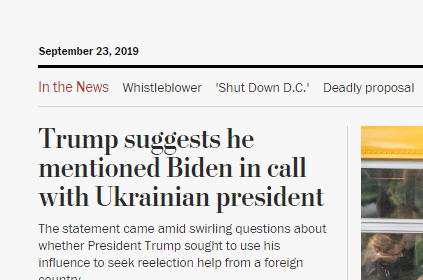9/25 update: David Colapinto, general counsel of the National Whistleblower Center, spoke about the disputed intelligence community case on NPR and C-SPAN’s Washington Journal.
“If you work in the intelligence community you must bring your concern to the inspector general before you can go to Congress,” he says. But an employee at Department of Housing and Urban Development, for example, “can go right to [their] member of Congress or the committee that has jurisdiction over housing,” and report their concerns. “Those are two major differences, as we’re seeing play out,” Colapinto says.
(The case) is testing the system set up by Congress…It is a failure if they don’t transmit the complaint to congress. it would be the worst possible outcome to have a whistleblower who did everything right, obeyed the law, did not leak to the media, had the complaint verified, and not have it go where congress said it should go.
Whistleblowers from the intelligence community face a different set of rules than other government insiders. The information they have about wrongdoing may be classified. Protection may be limited. Congress should be involved.
David Colapinto, general counsel of the National Whistleblower Center, explained this and more to The Washington Post and The Atlantic. The stories were two in an ongoing flood of reporting about the decision by director of national intelligence to withhold details about the Ukraine whistleblower complaint from Congress.
Colapinto called this move unprecedented and said it could further erode trust in the intelligence community.
“The system of whistleblowing will fail in the intelligence community if that complaint is not transmitted to Congress,” he said. “To have a whistleblower complaint verified as credible and urgent and not end up where it’s supposed to go would be the worst possible outcome. There would be a crisis in confidence in the intelligence community.”
The Atlantic quoted Colapinto in a story entitled “The Problem With the Whistle-Blower System.” The case, they write, highlights a conflict: The authorities reviewing the complaints may be implicated.
“It’s one of the biggest frustrations—that the people you’re blowing the whistle on have so much say over this,” David Colapinto, a founder and general counsel of the National Whistleblower Center, told me...
Advocates and lawyers have in the past raised two potential remedies to this problem: Create a legally protected channel for whistle-blowers to go to Congress on their own, or a way to let their complaints reach federal court. Neither has been adopted into law, however.
The recent complaint, Colapinto told me, shows why the congressional outlet for whistle-blowers is so important. Ideally, he said, their complaints could be brought directly to the House and Senate Intelligence Committees, whose members hold security clearances and are well versed in dealing with classified material. “They are perfectly … capable of handling classified information. That’s how they’re set up,” he said. “They do it all the time.”
He added: “[Whistle-blowers] shouldn’t have to jump through all these hoops. And now we’re seeing the abuses of that process playing out.”
Resources
Washington Post: Here’s what the law says.
NPR interview with John McLaughlin, former deputy director of the CIA
Pelosi: “A grave new chapter of lawlessness”
NYTimes: Charlie Savage on “What are the rules for intelligence whistle-blowers?”
